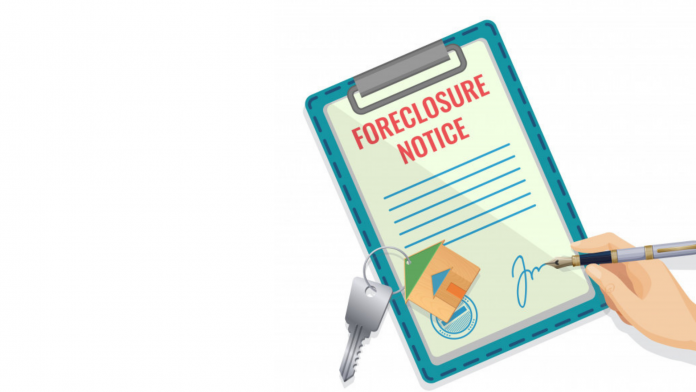A foreclosure rescue scheme is a scam that targets those whose house is facing potential foreclosure. The scheme preys on desperate homeowners whose mortgages are in default by offering to prevent the foreclosure. Ultimately with the likely end result of the owner being forced out of his/her home and losing even more money.
Foreclosure rescue schemes are typically advertised in a variety of informal settings. If you’re a homeowner struggling to make your mortgage payments and facing a possible foreclosure, a scammer might try to contact you. Moreover, scammers and companies say that they help homeowners save their home usually through a mortgage modification. However, often leave homeowners in worse shape than before.
Types of foreclosure rescue schemes
There are several ways foreclosure rescue schemes operate:
Lease-buyback
Here you as the owner turns the lease over with an option to buy it back later. You’ll be promised to be able to rent the property back, which will be counted toward an eventual buyback. These can be legitimate; however, in a scam, they may end in loss of the property or considerable additional cost.
For example, the renting prices may be made so high that the original owner cannot afford to continue paying. Additionally, the buyback price may be set far above the fair market value of the property.
Equity stripping
Equity stripping or equity skimming is a variation on lease-buyback and is one of the most common types of foreclosure rescue schemes. In it, the perpetrator assumes ownership of the house while allowing you to continue living there, provided that you pay rent to the perpetrator, who is the new owner.
However, the perpetrator often claims this ownership is temporary. Therefore you’ll later reassume ownership of the home once the terms of the loan are renegotiated. But after taking over the deed to the house, the perpetrator cashes out all the equity in the home.
The perpetrator also collects money from the victim by charging rent to the victim for living in the house while not owning it.
Unfortunately, the final result you’ll be evicted from the house with zero equity paired with a greater financial loss. The perpetrator, who then has ownership of the home, will either sell the property or allow it to go into foreclosure.
Consulting service
A firm may offer to act as an agent to renegotiate the terms of a loan with the lender, in return for a fee. However, the firms are unlikely to have any better negotiation power. Hence, the value of the fee may be disproportionate to the service received. This leads to the firm being unable to negotiate any better terms or in the worst cases may not contact the lender.
In addition, these firms may encourage you the borrower to avoid any contact with the lender. This being under the guise that such contact would interfere with their efforts to secure a modification. But it might reveal that the firm has not contacted the lender at all.
When negotiation does take place the firm may put in place a deal to buy the property from the lender. If the equity value of the property has reduced, then this may be at a lower price than the current outstanding debt. Lenders may accept this to guarantee payment now, rather than gamble on future values like the ability of you the owner to pay.
In these cases, the situation can be similar to the other schemes with the original owner being offered the option to rent the property with a future buyback. As for the other schemes in a scam situation, the terms of any tenancy or buy back may also be set to the gross disadvantage of the original owner.
Loan modification scam
In this case, a firm will market to you aggressively to help you get a loan modification. These scammers target the homes of older seniors with equity which are the types that servicers usually won’t modify.
Although they may help you get a modification for a rental property first in order to win your trust. When they get to the property with equity they will trick you into missing payments. This will be by convincing you to ignore the notice of default and notice of trustee’s sale.
Moreover, they’ll trick you into missing your sale date while telling you they are getting you a modification. Meanwhile, they will feed the property to their investors who will be waiting at the foreclosure sale to scoop up your hidden gem.
Tips to Avoid Falling Prey to Foreclosure Rescue Scams
Scammers prey on the desperate; they understand that people facing foreclosure will believe just about anything. Keep the following tips in mind to avoid becoming the victim of a foreclosure rescue scammer.
- Firstly, ignore calls, advertisements, posters, flyers, and letters offering help to save your home from foreclosure. Legitimate services that help people avoid foreclosure don’t seek out homeowners.
- Don’t take the advice of “rescuers” recommending that you break off contact with your housing counsellor.
- Be aware of tactics that scammers use, like lies, exaggeration, misinformation, and pressure.
- Don’t pay upfront fees to a foreclosure rescue company. Because so many “rescuers” disappear with clients’ money without performing any work, many states prohibit companies from collecting money before completing their services.
- If you’re contacted by a company you believe is trying to scam you, inform your lawyer. Your lawyer will take the matter to the police who will start an investigation.
- Don’t sign paperwork you haven’t read thoroughly or that you don’t understand. If you don’t understand what you’re agreeing to, have your lawyer review the documents before you sign them.
- Use common sense and research anyone you work with in trying to avoid foreclosure to ensure they’re trustworthy. If you have questions about foreclosure and ways to save your home, its best contact an approved housing counsellor or a lawyer.
Getting Help
An approved housing counsellor is an excellent source of information on ways to avoid a foreclosure, like loan modifications, short sales, and deeds in lieu of foreclosure.
Moreover, a housing counsellor will help you for free. In fact, cutting off contact with your counsellor is the worst thing you can do. They can tell you what loss mitigation (foreclosure avoidance) options are available, how to apply, and what’s happening in the foreclosure process.
If you need help straightening out a mess that a scammer made, consider talking to a consumer protection lawyer. You might also be able to sue the scammer for any money or property you’ve lost as the result of a foreclosure rescue scam. If you need assistance dealing with an impending foreclosure, contact a foreclosure lawyer.
If you’re already the victim of a foreclosure rescue scam, contact your lawyer directly to learn what damage has been done. For example, whether any deadlines have passed or whether any payments have been missed. Then figure out your options.














